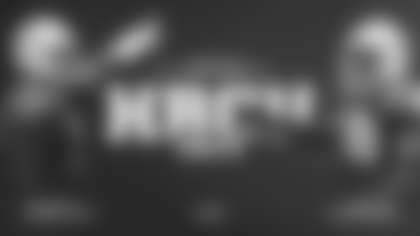Tom Moore spent 1998-2010 with the Colts. He was the club's offensive coordinator until his final season, when he served as senior offensive assistant. During his entire tenure (1998-2010), Indianapolis had 141 wins, nine consecutive playoff appearances, a league-record seven straight seasons with 12 victories, a league-record 23 consecutive regular season wins (2008-09), eight division titles, three conference championship game appearances, two AFC Championships and one World Championship, Super Bowl XLI. Nine times the club's offense ranked in the league's top five, five times it led in third-down conversions, eight times it ranked in the NFL's top three in scoring and seven times it ranked first in fewest sacks allowed. The team had 13 straight seasons of 5,000 net yards and scored 400 points 10 times. Manning won an unprecedented four AP Most Valuable Player honors. There were multiple players earning Pro Bowl and All-Pro honors. Moore is being honored today at Lucas Oil Stadium. He spent time recently with Colts.com for an extended question and answer session.
Q: How would you rank your years in Indianapolis among all the ones you spent in the NFL?
A: "It was 13 of the greatest years of my life, for my family, for me and for the experience. It was fun being part of something and watch it grow. Our first game (in 1998) was against Miami, and I think we had 60,000 fans there and it seemed like a whole bunch of them were Miami fans. To watch it grow over 13 years to going to two Super Bowls and filling the stadium every week and watching the fans get involved was fun. It was fun for me. It was great for the state of Indiana and the city of Indianapolis. The fans gave unbelievable support for the team. I will never forget it."
Q: How would you describe Jim Irsay as an owner?
A: "In my mind, he is the finest owner in the National Football League. Anything that has success, it always starts from the top down. Jim Irsay as an owner and as a friend is tremendous. He always was great to my family and me, and he did everything right. It was a privilege and honor to work for such a great man."
Q: How would he compare with Dan Rooney and the Rooney family since you have had the privilege to work for both?
A: "They both are great. The Rooney's were great. Mr. (Art) Rooney, way back when, the legend goes that he took his cue from the Mara family (New York Giants). They (Pittsburgh) were a tremendous organization to work for also. Jim Irsay and the Rooneys, they are two of the finest owners in the NFL."
Q: What can you say about the blueprint Bill Polian created in Indianapolis and the accomplishments he helped build?
A: "I don't think Bill Polian has an equal in the NFL. His knowledge of the game, of drafting people and knowing who to draft and how to spot players, to me, is unparalleled. The success he has had maintaining the program over a long period of time in the era of free agency is unsurpassed. He has no equal. He by far is the best who has ever been in the league. The proof is in the pudding. He did it in Canada, Buffalo, Carolina and he came to Indianapolis and did the same thing here. He knows what it takes. He knows the chemistry involved in putting a team together. He knows what it takes in the hiring of coaches. He has no equal. He may be the best who ever has been in the sport as a general manager and talent evaluator."
Q: The team had the winningest decade in NFL history in 2000-09 with 115 regular-season wins. What does that mean to you?
A: "It means a lot to me personally to be a part of it. It also means a lot to me to be associated with it for Jim Irsay and Bill Polian. The hard work they have put into it as an owner and general manager to try to create the situation to succeed is very difficult. I am happier for them than I am for me. The other people I am tremendously happy for are the people in Indianapolis. The fan support has been great. They love their football. When I first went there, it was a basketball state. Through Jim Irsay's efforts and Bill Polian's efforts, we turned the corner and made it a football state. That means a lot to me. It means a lot to me to be part of a situation where those people have had success and the enjoyment that goes with it. It's not for me. It's also very much for the players. I've always been a big 'players' guy. I'm for the players. Nobody has any idea how much hard work and dedication they put in to have the success that they've had. It means a lot to me that the players have enjoyed that success. Those are the most important people I was concerned with. Don't worry about me. It never was about me."
Q: When you think of all the accomplishments, what stands out to you the most?
A: "It's too hard to narrow down. The biggest thing is the evolution of the whole process, from day one when we started doing this in 1998 and seeing where it went over the next 13 years. To have the continued success was very gratifying. To see the vast number of great players we had who came in and contributed to what was done is what you remember. To see Peyton Manning, Marvin Harrison, Reggie Wayne, Dallas Clark, Jeff Saturday, Dwight Freeney, Robert Mathis, Gary Brackett and many, many others, to see all those guys have the great success they've had means a lot to me because of the time and effort those guys have put into it to be successful. To be just a tiny part of that makes you feel good. A coach's job is to give those guys an opportunity to be the very best they can be. They've had great success. They've been to the Super Bowl. They've won the Super Bowl, which is the pinnacle of professional football. To see those guys do it, you can't describe it."
Q: How would you describe Jim Mora as a head coach?
A: "Jim Mora did a tremendous job. He came in and got the program turned around. He did a great job, in my opinion, establishing the work ethic that the Colts bought into and that they perpetuated over a long period of time. That is critical in a successful football team. Jim did a tremendous job."
Q: You have known Tony Dungy since recruiting him out of high school. What makes him so special?
A: "Tony is a guy who became a very successful football coach because he became a football coach. He would have been successful at whatever he decided to do. He chose football because he wanted to work with people. He loved the game. Tony is extremely intelligent. He's hard-working. He's a people person. He is consistent and very even-keeled. He's not a 'high-low' guy – he's the same in victory as he is in defeat. He maintains a tremendous calm among a team. He did a great job with his leadership. The players respected him. I am very partial to Tony because I go way back when he was in high school, and I coached him in college. He's like Peyton Manning, he's special."
Q: Describe Jim Caldwell as a head coach.
A: "Jim Caldwell was a perfect hire for the job. Jim was the quarterback coach for years, and I always believed in letting coaches coach. That's what they want to do, and Jim did a tremendous job of coaching Peyton. He was a very, very loyal assistant, and he was the right hire for the job. He did the great job the first year. Injuries can block out a lot of things, and Jim has dealt with that extremely well. Last season was proof of that. Jim is a tremendous head coach who is doing a fine job."
Q: Where did the victory over New England in the AFC Championship game rank for you?
A: "Obviously, it was big, extremely big and it was a long time coming. I try not to be one of those 'high-low' guys myself. Both Tony and I were taught that by Chuck Noll at Pittsburgh. It was a great victory. It propelled us into the Super Bowl, which is the pinnacle. Without a bunch of victories before that game, that victory would have meant nothing. You have to take the good games and bad games and learn from all of them. When they're over, you have to put them to bed and go on to the next game. I believe that firmly."
Q: There is a memorable picture of you on the bench after that game looking totally spent. What can you convey about that picture?
A: "My great granddaughter said, 'That's Poppa crying.' Little did she know I wasn't crying. I was just tired (laughs), and I was spent, and very, very happy. I was happy for the players. I'm happy for Jim Irsay, for Bill Polian, for the players – that's what makes me tick. Having success for the people who put all the hard work in it, then realize the fruits of their labor, that's what makes me feel good. It's not about me. Also, the fans had poured so much emotion and support into the team over many years, and they were big for us in a great moment. I was very happy for them, too. They got to share a special moment with all of us. I think they were spent, too. It was great for the franchise and city."
*Q: If you don't rank favorite games or plays, you wouldn't have one, would you? *
A: "Sometimes people get tied up in fancy plays and sometimes a key to a game is converting a third-and-one on a two-yard run. It's the sum total of the game, not a single play."
Q: The team produced 5,000 net yards in 13 consecutive seasons and scored 400 or more points 10 out of 13 times. How is that possible and what does that mean to you?
A: "(Laughs) I'll tell you what it means. It means we had some real, real great players. That doesn't happen without great players. That doesn't happen without guys paying the price during the off-season, paying the price during the season, and it's a tribute to the type of players we had on the team. Those are the players who were drafted and signed by Bill Polian and by Jim Irsay, who supported all the efforts with his dedication to win. It's to their credit that all of it happened."
Q: What was it like when the team won 23 consecutive regular-season games in 2008-2009?
A: "It's a bunch of great guys doing great things. I'm old fashioned, though. That's what you're supposed to do. You're supposed to win. I'm not an 'up-and-down' guy, jump off the diving board after a win and go sit and sulk after a defeat. You go out and play games. I haven't been in a game yet that I didn't expect to win."
Q: How was it to start with Peyton Manning as a rookie and help him achieve what he has done in his career?
A: "It is hard to describe my feeling and admiration for Peyton Manning. He is special. He is a great quarterback. The nicest thing I can say about him is that for as great a quarterback as he is, and he is the greatest, he is even a better person. It was fun to start with him and see him grow. He gets all the credit because of his hard work and his dedication to the game, his study habits, his training habits. All those things precipitated what happened with him. It makes you feel good when those things do happen for him, because you know all the hard work he put into it to realize that. I'm indebted to Peyton. Peyton makes you a better coach. He makes a team a better team because of his work ethic. He upgrades every part of an organization that he touches. It's infectious. Everybody's better with him. When you get a guy like him to coach, it's fun because you know he's going to work like there's no tomorrow. That's what makes coaching fun. You're happy for him and to see him enjoy the success he's had."
Q: How special is he and has there ever been anyone else ever like him?
A: "I don't know. I haven't been around everybody, and a lot of coaches might have a person they would identify. I know this, I've never been around anyone who has had that dedication, that work ethic, that relentless pursuit of greatness that Peyton has."
Q: How many quarterbacks could do what he does to help direct the offense?
A: "That's tough to judge because how many quarterbacks would coaches give that opportunity that he was given? You get a guy like Peyton, and he's special. One of your things in coaching is to give a player a chance to be the very best he can be. To me with Peyton, to be the very best he can be, you have to give him a lot of latitude because he can do it. You've got a guy who's special. When he's out there, he knows what to do. Don't take a quarterback and put handcuffs on him. That's what we tried to do, give Peyton the full right to operate. We would say, 'If you see something, go for it.' I used to tell him that before every game. People would say, 'Did it bother you?' Heck, no, I'm for the player. I want the player to be as good as he can be. I want to give him every opportunity to do so. I told him, 'If you see something, go for it, don't worry about anything.' I called all the interceptions, he called all the touchdowns."
Q: What do you remember from the 2004 season when he threw for 49 touchdowns? How 'in it' was he that year?
A: "He was 'in it' every year. That year we got hot. We played Green Bay and we threw the first 22 plays of the game, and he had four touchdowns. We played Detroit on Thanksgiving Day and he threw six touchdown passes and had only five incompletions. He got hot and took things that he saw out there. He saw things out there and made an unbelievable number of great decisions. It was all him. It was him."
Q: How special was Marvin Harrison as a player?
A: "Marvin Harrison is a super individual and a great player. He worked extremely hard. He was a very private person but once he came in the office and on the practice field, it was his life. He worked extremely hard. He was a great athlete."
Q: Peyton Manning has more than 10,000 passing yards to Marvin Harrison and to Reggie Wayne. No other quarterback ever has completed passes for more than 10,000 yards to one receiver. Peyton has done it with two different guys. That has to count for something to you, doesn't it?
A: "It goes back to their hard work and dedication. That's why I say, and I've always said and will say, the game is for the players, not coaches. It's for the players. It's a coach's job to get them in the right position to do those things, but it's the players. Nobody has a clue how much time, effort and work, and how difficult it is. I love it when they do it, and I love it when they get all the credit in the world, because they should."
Q: How do you feel for having been a part of three Super Bowl champions.
A: "It's living a dream. My whole life has been living a dream. I played the game. I was never that great, but I enjoyed it. I played it in college. We had success in high school. We were 27-1 and won a state championship. At Iowa, I was never a great player there, but I was part of a team that was a national champion and won a Rose Bowl. Then I got an opportunity to coach in college and pro football with great organizations. I worked for great head coaches. Everything I learned in pro football, I learned from Chuck Noll. He may go down, in my opinion, as the greatest head coach that's ever been in the NFL. He has four Super Bowl wins in six years to prove it. To coach all the great players and work with all the great coaches and to work for the great owners that I've been privileged to do, it's living a dream. Not many people get a chance to live a dream."
Q: Behind many successful men are great wives and children. That certainly is the case for you, isn't it?
A: "No question. My wife is the greatest woman who ever lived, and I lucked out there, too. I've been lucky my whole life. I married the greatest woman in the world. To put up with me for 48 years, it takes a great woman. She's done it and raised two great children. My life, I've been blessed. I know it, and I appreciate it. I know that I've lived a dream."
Q: What is so special about Colts fans and what would be the one message you would like to say to them?
A: "The Colts fans are the greatest. They stuck with us, they hung in there with us and each successive year you would go to away games, you kept seeing more blue shirts, and more blue shirts, and more blue shirts. I remember in Arizona in 2009, we were leading pretty substantially in the fourth quarter and all I remember is all the red shirts were gone it was all blue shirts. The players and coaches feed off that. I don't think you can say enough about the city fathers and the way they planned the city of Indianapolis and got it involved in all it is involved in. In the 13 years I was there, the town football-wise went from trying to get people to come, then they packed the stadium, then we went to the Super Bowl, then you get a new stadium and go to the Super Bowl again, and now the Indianapolis fans have a Super Bowl coming to them. I think that speaks volumes for the city and the fans. I haven't really retired, but when you sit and look at the Colts' horseshoe logo, it has the seven holes where you put the nails in to secure the horseshoe on the hoof. I think of those seven holes and what they mean to me are, 'It is great to be a Colt.' That's what the horseshoe means to me."













